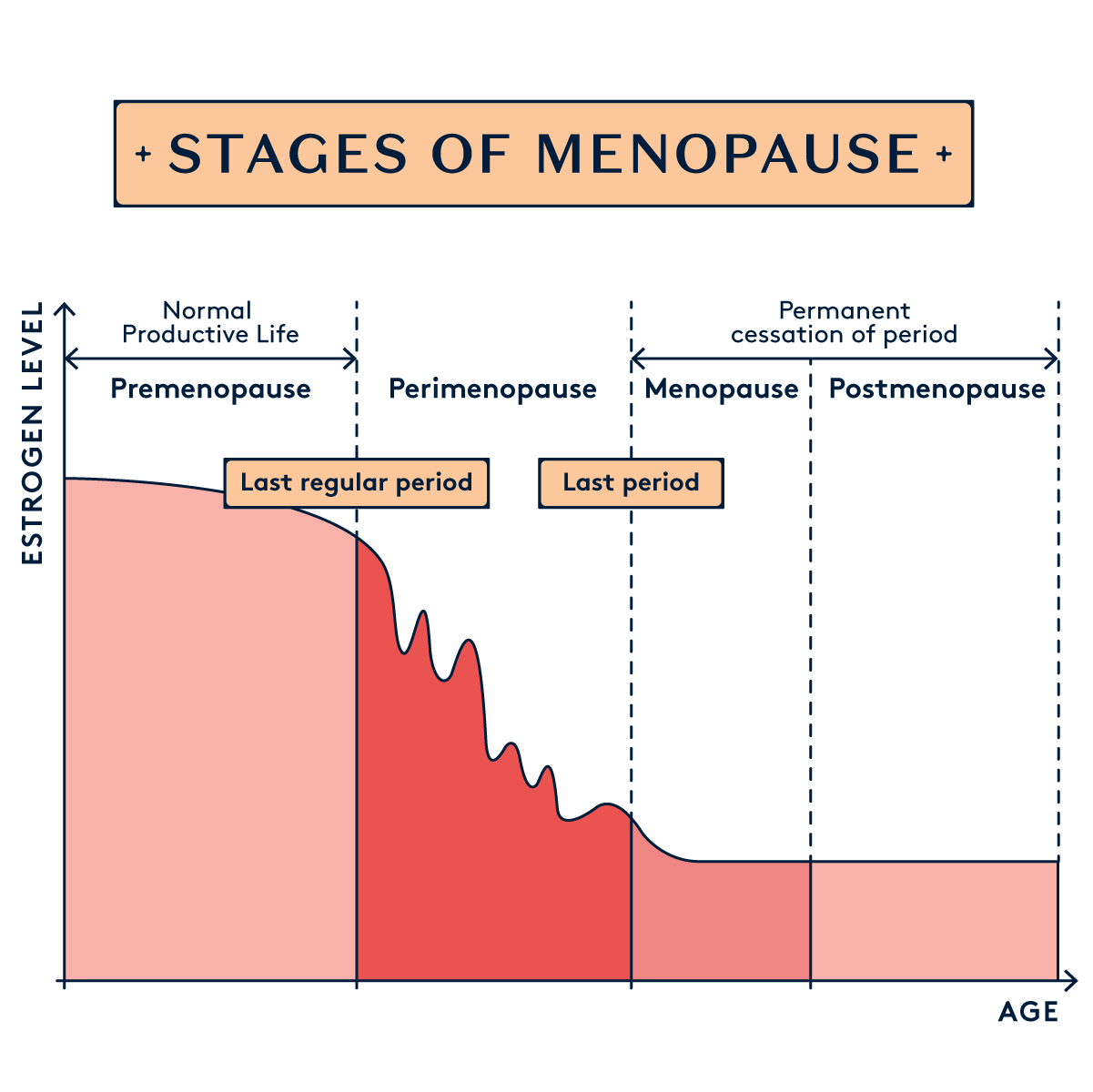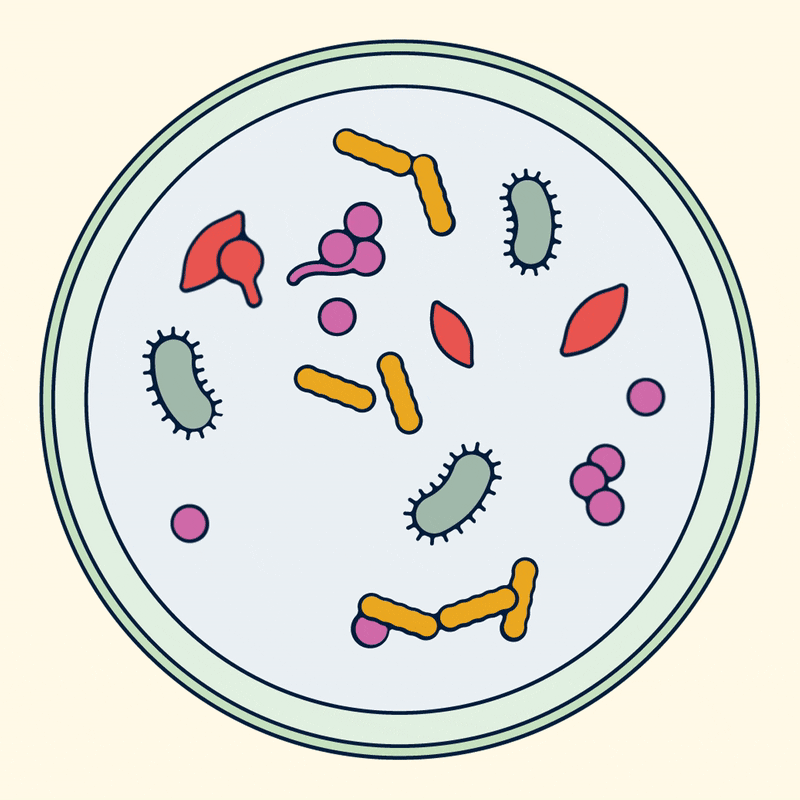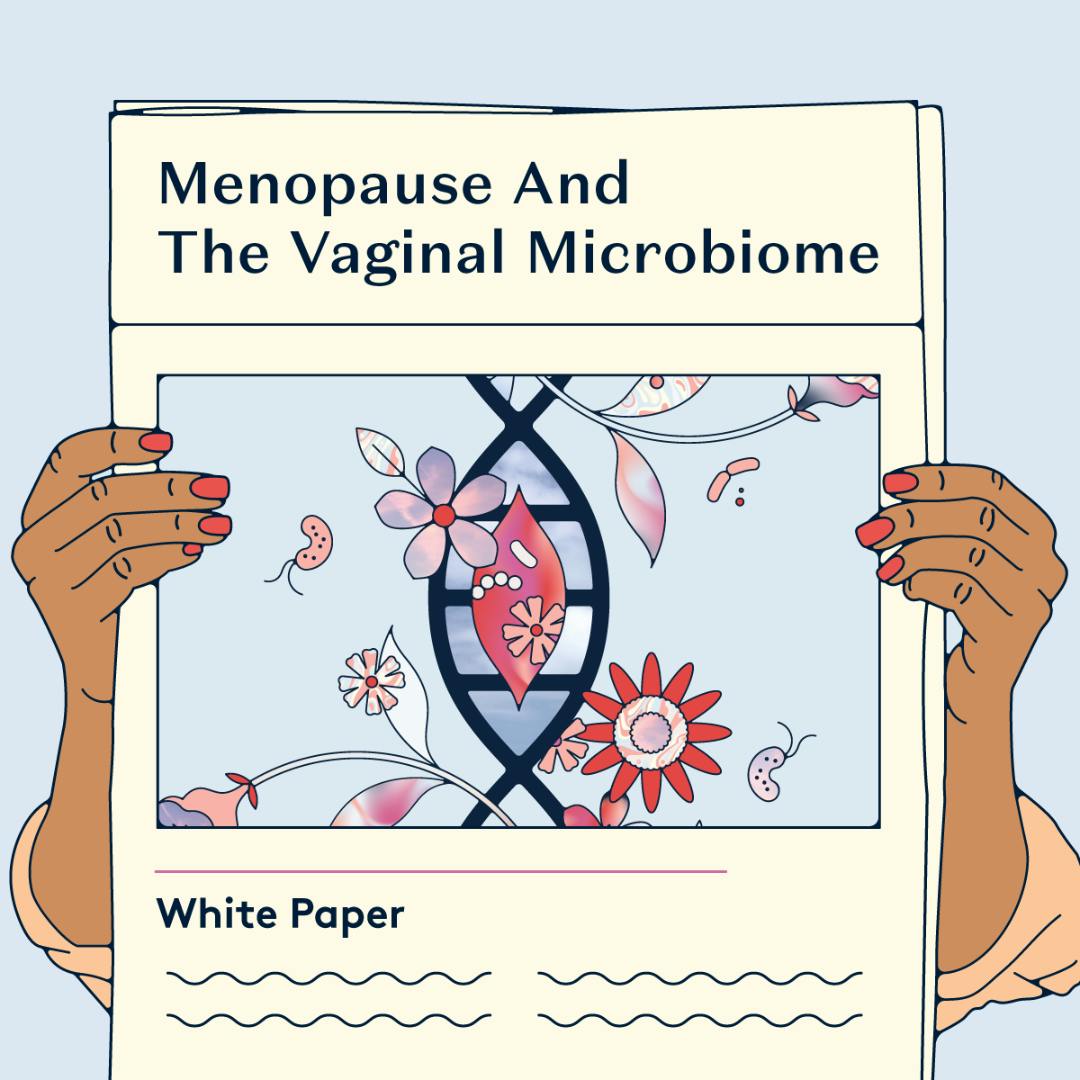Table of contents
1. What are perimenopause and menopause?
2. What is the Vaginal Microbiome?
3. How does menopause impact the microbiome?
4. Why should you care about your microbiome?
Illustrated by Erin Rommel, Sabrina Bezerra & Ralitza Nikolova.
The transition to menopause is a natural biological process that marks the end of reproductive years for women and AFAB individuals. Along with hot flashes and mood swings, menopause also brings changes to the vaginal microbiome. These changes can lead to an increased risk of vaginal infections and other health issues. While this transition can be difficult and uncomfortable for many, it doesn’t have to be - and your microbiome might just be able to help.

What are perimenopause and menopause?
Perimenopause is the transitional period leading up to menopause, which marks the end of menstruation. It can start several years before menopause, usually in a woman's 40s, but sometimes earlier or later. During perimenopause, the ovaries begin to produce less estrogen, causing changes in menstrual cycles, such as irregular periods, heavier or lighter bleeding, and spotting. Women may also experience symptoms such as hot flashes, night sweats, mood swings, vaginal dryness, and sleep disturbances.
Menopause, on the other hand, is the point at which a woman has not had a period for 12 consecutive months. It marks the end of the reproductive years and the decline in hormone production from the ovaries. Menopause usually occurs in a woman's early 50s, but it can occur earlier or later. Women may experience similar symptoms to those of perimenopause, such as hot flashes, vaginal dryness, and mood swings. Other symptoms that may occur during menopause include urinary incontinence, decreased sex drive, and osteoporosis.

What is the Vaginal Microbiome?
The vaginal microbiome is made up of a complex community of microorganisms, including bacteria, viruses, and fungi that live inside the vagina. This ecosystem is important for maintaining the health and integrity of the vaginal mucosa, which serves as a barrier against the entry of pathogens into the body. The balance of the vaginal microbiome is maintained by a delicate interplay of hormones, the immune system, and nutrients in the body.
A healthy vagina is one abundant in lactobacilli, the protective bacteria. Lactobacilli produce lactic acid, a natural antimicrobial substance, which lowers the vaginal pH, keeps the vagina acidic, and fights off pathogens and infections like E.coli, Candida, and STIs.
“
Vaginal dryness and atrophy has been linked to low lactobacilli levels.
How does menopause impact the microbiome?
Recent clinical research has shown that menopause also brings changes to the vaginal microbiome, which can lead to an increased risk of infections and other health issues, such as vaginal dryness and atrophy. As women enter menopause, their levels of estrogen decrease, which can lead to changes in the vaginal microbiome by lowering the vaginal pH. This change in the environment can lead to an overgrowth of harmful bacteria and fungi, such as Gardnerella vaginalis and Candida, causing bacterial vaginosis and thrush.
Additionally, the decreased production of estrogen can lead to atrophy of the vaginal walls, which can cause dryness, itching, and pain during intercourse.
Vaginal dryness and atrophy has been linked to low lactobacilli levels and studies show that replenishing your microbiome can help relieve vaginal symptoms.
Why should you care about your microbiome?
Given the changes that occur in the vaginal microbiome during menopause and their potential impact on wellbeing, it is important to monitor them regularly. The good news is that microbiome fluctuations are reversible, as well as the symptoms that come with them. At-home tests, such as pH test strips and microbiome screening are a convenient way of making sure you are well-protected and in charge of your vaginal health, without having to leave your home.
Regular check-ups with a specialist will help you make sense of your results and choose the right form of treatment. Hormone Replacement Therapy (HRT) is the most effective treatment for preventing the vaginal symptoms associated with menopause. It can be administered in the form of creams, tablets, or rings, and is applied directly to the vagina to relieve symptoms of dryness and itching.
Certain lifestyle changes, such as eating a healthy diet and avoiding smoking, can also help maintain a healthy balance. Probiotics are another option that can be helpful in supporting a healthy vaginal microbiome. Probiotics are live microorganisms that can promote the growth of beneficial bacteria in the vagina. They can be taken in the form of supplements or applied directly to the vagina in the form of suppositories or creams.
Menopause can be a difficult time for many women, but it doesn't have to be unbearable. There are several ways to manage the symptoms of menopause and make the transition smoother. One of the most effective ways is to maintain a healthy lifestyle, including regular exercise and a balanced diet. This can help to reduce hot flashes and improve overall well-being. Additionally, there are several medications and alternative therapies available, such as hormone replacement therapy and herbal supplements, that can help to alleviate symptoms. It is important to consult with a healthcare provider to find the right treatment plan for you. And finally, if you are going through menopause, don't forget about your microbiome! It may be experiencing some changes too. Keep it healthy with regular check-ups, probiotics and a balanced diet for a smoother transition.

Note: This white paper is intended for informational purposes only and should not be used as a substitute for medical advice or treatment. Consult with a healthcare professional before taking any action or trying any new treatment.






